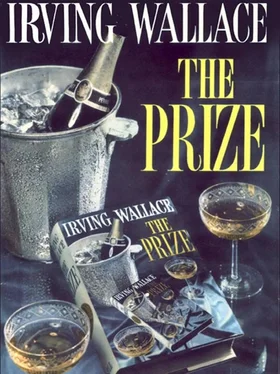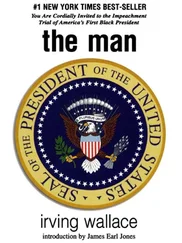As he watched Norberg link her arm in Hammarlund’s arm, and join Hammarlund’s company, Craig saw Emily Stratman detach herself from that group. He fancied that she had tried to catch his eye, but he was not certain. She had placed her empty glass on a table, and was moving towards the French doors. Craig’s gaze followed her passage, and Norberg was forgotten. If femininity was desired, femininity and provocation and mystery, Emily carried all these more naturally. The silk jersey gown clung to the contours of her body as she walked, to the wavelike vacillation of her breasts, to the sinuous, rippling thighs. She had lifted the latch on the French door, and then she was gone.
Craig looked over his shoulder. Leah was elsewhere absorbed. Immediately, he started for the terrace.
Outside, the air was colder now, and the English lamps seemed shrouded. At first, he could not find her, and then he made her out at last, her back to him, arms folded against the weather, in a shadowed corner of the veranda.
He went to her. ‘Emily-’
She revolved towards him, slowly, without surprise, her green eyes and innocent face serious and trusting.
‘-it’s too cold out here, but’-he faltered, because her eyes were intent on his mouth, and she was not listening-‘I had to see you alone.’
She said nothing, but her bare arms crossed, she seemed to lean towards him, and he placed one arm around her shoulders, spontaneously, unthinking, to draw her close and give her garment warmth and body warmth.
In his half embrace, she lifted her face, eyes closed, soft lips parted, and momentarily he was mindless of discretion and consequences. He brought her up to him, her back arched against his hand, until his mouth met her moist lips. The kiss held for a small infinity, until both his arms had gone around her, and the kiss deepened, and rising passion gripped them both.
Suddenly, with a gasp, she withdrew her lips from his mouth, eyes still tight, but averting her face, yet remaining in his hold.
‘Emily,’ he whispered, ‘my darling-’
She buried her face low in his chest, saying not a word, and as he stroked her shining hair, the sounds of a brass gong from within, once, twice, three times, brought them back to themselves, their separateness, and the stone terrace, and the night’s chill.
The butler’s voice in the living-room followed the echoes of the gong. ‘Dinner is served… dinner is served.’
Emily pushed free of Craig. ‘They’ll be looking for us,’ she said.
He caught her arm. ‘No, Emily, wait-’
‘We must,’ she said, and she went inside.
For a few seconds, Craig remained stationary, unconscious of the weather, still savouring her lips and the compliance of her body and their intimacy. At last, eager to lead her in to dinner beside him, he went through the French door.
He saw at once that most of the guests had disappeared. Four couples were still in line, in the regulation Swedish manner, ladies to the right and their gentlemen partners to the left.
He was surprised that Emily had not waited for him. Perhaps, he told himself, she had not seen the revised seating-plan.
Since he was tardy, he decided to take a short Scotch in to dinner. Ordering it, his gaze fell on the placard marked Placering , and then what held him-unless it was a trick of vision-were two blotches. Perhaps his erasures were clumsy, he thought.
He made his way to the chart to enjoy again his arrangement: Emily Stratman, Andrew Craig, Margherita Farelli.
The blotches he had observed were real, but they were not from his erasures. Firm new erasures were on either side of his name.
Emily Stratman was no more. In her place was written the name of Leah Decker. The return of Leah Decker, neatly written in a hand he recognized as the familiar hand of Leah Decker. Craig’s own name remained untouched, unchanged. But like Emily, his other partner had disappeared also. Margherita Farelli was gone, and in her place, in an unfamiliar hand, but in a hand distinctively feminine, was pencilled the name of Märta Norberg.
‘Here you are, Mr. Craig.’
He turned to find Märta Norberg smiling at him. ‘You see what we think of you? You are the partner of the hostess. You are to be at my left. Ragnar is about to make his speech of welcome. Will you take me in?’
IN the centre of the Old Town of Stockholm there exists one of the architectural curiosities of the city and among the foremost of its tourist attractions. This is Mårten Trotzig’s Lane, an official street no more than three feet wide. The lane is not level, but consists of worn stone stairs that descend steeply, between the caked walls of old buildings, beneath two wrought-iron public lamps, into Västerlånggatan.
Mårten Trotzig’s Lane was both Nicholas Daranyi’s cross and vanity. His ground-floor, three-room apartment was located flush with the thoroughfare of Våsterlånggatan, and only a few buildings down from the lane. The disadvantage of this was that being on the street, so close to traffic, so near a guide-book site, made quiet and peace almost impossible for Daranyi to achieve. In summer and winter alike, the bands of tourists were chattering magpies beneath his window, running to and from the lane, constantly vocal-in English, in German, in Danish-in praise of its oddity. Daranyi liked to read and contemplate what he read, and meditate on things he had seen and things he had done in his wandering life, but the location of his apartment made such monastic retreat impossible.
Yet, for almost no money on earth would Daranyi have surrendered his apartment and lived in a more modern and tranquil one in the new city. Even though his apartment’s situation had its shortcomings, and even though the rent was slightly beyond his means (which meant skimping on other necessities, here and there), Daranyi treasured it for its address. This was snobbery, and he knew it, and did not mind, for such superficialities were of importance to him. His apartment was in one of the most respected and desirable sections of the city, and one of the most ancient, and for a stateless man who had lived from hand to mouth so long, it was worth anything to have the dignity and rooted tradition of such an address.
The best times in all the year were the dark early mornings of winter and the dark long nights of winter. Then the tourists did not come, and few trod the steps of Mårten Trotzig’s Lane, and Daranyi had his address and peace as well.
Now it was Daranyi’s favourite time, the dark early morning of December seventh-8.15 in the morning-with the air in the streets like the wall of an iceberg. Occasionally, snowflakes flurried and swirled and briefly hung suspended in the frozen air, before slowly parachuting to the pavement. It was a morning to be off the streets, to be snug and comfortable in a heated apartment, and Daranyi was, indeed, snug and comfortable in his heated apartment, and convinced that he was one of God’s favoured souls. However, what made his bliss complete was not warmth and roof alone, but an added security that was man-made the immediate prospect of considerable income.
Daranyi was proud to have so distinguished a figure as Dr. Carl Adolf Krantz call upon him at this address, seek him out with restrained urgency, partake of his hospitality-the brown leather chair, antique table from Bukowski, steaming coffee, buttered rolls-as Krantz was now doing, and offer, by his very presence, the promise of money in a period of financial drought. Krantz’s visits to this address were infrequent, but always welcome, for they were never merely social or frivolous. When Krantz appeared, cash was not far behind. True, during his cryptic call to Daranyi shortly after his return home late last night, and during the first ten minutes since his arriving this morning, Krantz had not spoken one word of an assignment, but Daranyi knew , felt it beneath the layers of flesh, perceived it in his bones.
Читать дальше












